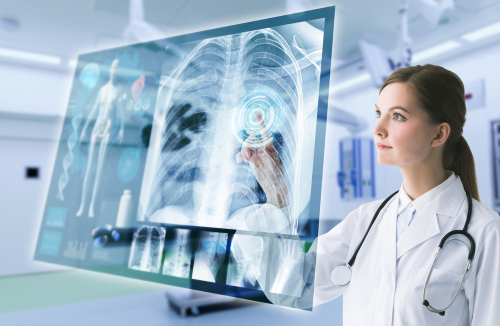Investing in healthcare should be the main focus of our society. With better solutions and more effective care, we will be able to recover more quickly and to combat some diseases that were deadly just a few years ago.
However, we can’t cure cancer and AIDS right away. We need to move in small steps and apply the technological advancements we already have at your disposal.
Solutions like artificial intelligence and machine learning have had a great impact on healthcare. However, there is one revolutionary technology that can benefit healthcare more than we could imagine – the internet of things.
A rising industry
Business Insider recently forecasted that the healthcare IoT industry is set to grow from $95 million in 2015, all the way to $646 million in 2020. This is a figure that hospitals and healthcare providers simply cannot ignore.
Not too long ago, the HITECH (Health Information Technology for Economic and Clinical Health) Act allowed patients to use portal technology to access their records the same way doctors do.
This allowed people to track their conditions, act quickly and schedule appointments if needed. Microsoft also caught word of this development, so they introduced the Microsoft Azure cloud platform to enable easier access and delivery of healthcare services. Others soon followed.
Lowering the costs of healthcare
Did you ever think about why healthcare services are so expensive? The answer to this lies in the immense amount of work doctors and nurses have to invest. With connected medical devices, doctors will be able to monitor patients even when they’re not in hospitals. This will result in a few beneficial situations, too:
- Doctors and nurses will be tasked with handling only the most extreme cases and situations where there is a need for hands-on work.
- As a result of this, they will be well-rested and ready to give their maximum effort when it matters.
- Hospital facilities that will be built in the future won’t need large waiting rooms. The space will be much smaller, resulting in cheaper building costs and healthcare service fees.
- Medical professionals will find it easier to allocate work, solve cases faster and give people the services they paid for.
Improved patient experience
Imagine the average hospital today. Nurses running around with a lot of work on their hands, waiting rooms that are so full that people have to sit on the floor and so on. It’s not an ideal place to create a good patient experience, is it? Most definitely not.
With IoT, patients will be constantly connected to their healthcare provider and receive instant updates about drugs they have to take, treatments they have to receive, etc.
There already ideas for apps that can synchronize with heart monitors, CT scans, and more. Some medical experts have suggested using services like EssayMama and Edu Birdie reviews to provide patients with informative content about their conditions.
Imagine receiving information about your condition, treatments, statistics and everything else you need to know. Patients will be more involved in the services they are receiving. It’s a liberating future that will educate patients and give them the knowledge to act on their own, if needed.
Better application of drugs and treatments
Hospital staff often spends hours and days searching for the right drugs or approach for a particular patient. IOT gives the solution to this problem, prompting healthcare professionals to standardize treatments and apply them immediately.
There are also problems with tracking supplies, ordering expensive medication and special equipment, which IOT can easily solve using powerful integration capabilities.
With IOT healthcare monitor, patients will receive solutions that will have an immediate effect on their health and receive the right prescriptions. Any checkup or treatment will yield results much faster than without IOT. It’s all about improving the overall efficiency and quality of the healthcare system as a whole.
No more errors and waste
One big benefit of IOT solutions is that it allows better workflow automation and data collection. Imagine the abundance information doctors will have at their disposal.
There will be no more expensive tests that lead to nothing, nor equally pricey imaging sessions that go to waste. Standardization of processes will be something that benefits both the patient and the doctor, on a large scale.
System costs will drop, as well as the fact that the won’t see human errors at all. IOT allows doctors to analyze existing and past cases to better prepare for future occurrences of that same condition.
Better treatment outcomes
All of this comes up to one crucial point – effectiveness. IoT will give medical professionals the ability to maximize their efforts and turn them into results. Healthcare solutions will be better connected to each other, resulting in better analysis and patients getting cures as quickly as possible.
All of this gives healthcare professionals an ability to make better assessments and to reduce the number of returning patients. The main goal is to use hospitals and healthcare facilities as places for checkups. Better assessment will lead to less illnesses and quick treatment.
Concluding thoughts
IOT in healthcare allows, first and foremost, for the costs to come down. With IOT solutions, there will be no more unnecessary tests and countless checkups. Because hospitals won’t waste money, individual services and insurance packages will be much more accessible to everyone.
Patients will have better experiences and there will be much less mistakes than before. Investing in IOT is a victory for everyone, and, if executed correctly, we might find the average lifespan increasing drastically in the next few decades. We just have to wait and see.

